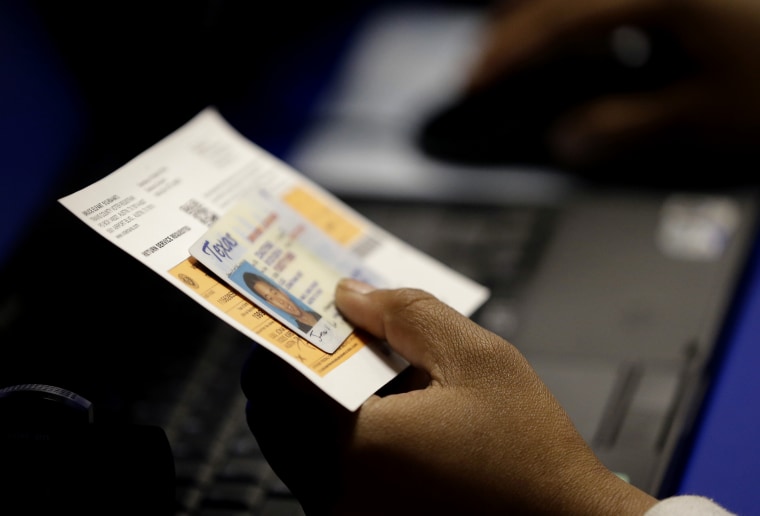This column is part of "The State of America," an msnbc.com series leading up to President Barack Obama’s 2015 State of the Union Address on Tuesday, Jan. 20. This is the state of the issues you care about, as told by organizations promoting social change and other policy experts.
This country has a long and complicated history with voting rights. Though universal suffrage was granted in 1920, it took years of organizing to pass the Voting Rights Act of 1965 and finally secure unencumbered access to polling places. Now, nearly five decades later, politicians in Texas have been systematically chipping away at those protections — through voter ID laws, overreaching registration regulations, and other hurdles designed to drive down the number of people who are able to make their voices heard at the ballot box.
In fact, Texas is the next great battleground for voters’ rights.
Texas’ voter ID law was one of the most publicized voting restrictions of 2014 — in part because of the drama surrounding a last-minute Supreme Court decision to keep the law in effect only days before voting started in the 2014 gubernatorial election. Ruled to be “intentionally discriminatory” and likened to a poll tax by Fifth Circuit Court Judge Nelva Ramos, the law does more than require identification in order to vote: it limits the acceptable forms of voter identification to a select few – a concealed handgun license is acceptable, for instance, while a Social Security card is not. As a result, last November, about 600,000 registered Texas voters – a group that was disproportionately African-American, Latino, young and elderly – were at risk of being kept from the polls by this restrictive law.
"Texas has some of the lowest voter participation in the country. Redistricting has made local elections across the state so uncompetitive that many races are considered over before Election Day."'
Lesser known, but still just as important, are the state’s voter registration restrictions. Texas is home to an estimated 3 million unregistered voters. Yet the state boasts some of the strictest regulations governing voter registration in the country. Volunteers must be trained and certified before registering voters, yet there is no state-wide certification. Instead, volunteers must get certified by each individual county before registering its residents. With 254 counties in Texas, it would be virtually impossible to get certified everywhere in the state. Certifications expire every two years, and when and how often trainings are held is up to each individual county.
But perhaps the biggest hurdle to change in Texas is the sense from voters that their voices don’t matter. Texas has some of the lowest voter participation in the country. Redistricting has made local elections across the state so uncompetitive that many races are considered over before Election Day. These restrictions, the voter ID law, and registration hurdles send a strong message from lawmakers to voters: We don’t think your vote should matter. And after more than 20 years of Republican rule -- conveniently maintained by keeping many of the most-often disenfranchised voters away from the polls -- it’s little wonder voters often feel powerless in the Texas political process.
Related: With new year comes new obstacle to voting in Texas
The irony is that those who may feel the most powerless are actually the most powerful. And grassroots organizing is making all the difference. In 2014, Battleground Texas volunteers went door to door to talk with millions of voters, making sure they had the ID they needed to vote. Alongside the Texas Democratic Party, Battleground Texas created the first-ever state-wide Voter Protection Hotline, fielding questions from voters about complicated ID requirements, and helping many acquire the temporary identification they needed to vote. 34,000 volunteers organized their communities across the state, and 9,000 jumped through all the necessary hoops just so they could register voters. Their contributions played a role in helping Texas surpass 14 million registered voters for the first time ever.
A state like Texas won’t change overnight, but very little worth doing is ever easy. And Texans aren’t exactly known for giving up on a hard fight. Although their Volunteer Deputy Registrar certificates expired on December 31, Battleground Texas volunteers are already rushing to county training sessions to get re-deputized, and hundreds of volunteers in Dallas, Houston, San Antonio and across the state have already gotten their new certification, and are organizing events in their communities. They know that one of the most important things they can do for their state is to go out there, and start registering voters again.
"The irony is that those who may feel the most powerless are actually the most powerful. And grassroots organizing is making all the difference."'
There’s no question the stakes are high in Texas. That’s why in 2015, so many volunteers are continuing to organize in their communities and register more voters. Battleground Texas will also explore new ways we can help knock down the existing hurdles that keep voters from the polls. Together, we’re fighting for a Texas where the governor is elected by more than just 20% of eligible voters; where sensible issues like raising the minimum wage or funding quality education aren’t cast aside because of partisan politics; and where every voice not only matters, but is counted.
Put simply, we’re fighting for a new kind of Texas: one that represents all of us.
Jenn Brown is the Executive Director for Battleground Texas. Jerry Villegas is a lawyer, and voter protection volunteer for Battleground Texas.
